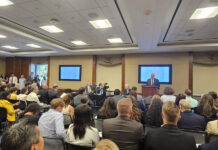By Davit Safaryan
Special to the Mirror-Spectator
After the Armenian parliamentary elections of June 20, the issue of establishing official relations firstly with Azerbaijan and then with Turkey has risen again. Consequently, the specialists and those dealing with this problem are trying to understand whether the contacts between Armenia and Azerbaijan under Russian auspices could lead to some tangible prospective. Russian President Vladimir Putin is obviously consistent in his efforts to re-launch routes of communication and international transportation through the South Caucasus for the sake of economic development. We have already stated in our previous article in the Mirror-Spectator in early August that re-opening of communications between Armenia and Azerbaijan may be followed by the re-opening of the border and re-launching of rail- and motor ways with Turkey. Therefore after 2009-2011 the package of issues connected with the settlement of Armenia’s relations with Turkey, establishment of diplomatic relations and re-opening of the communication ways actualizes anew. In this analysis we’ll try to see what hinders solving this problem from the end of the 44-days war up to the present.
Where are the ‘Anadolu’ Armenians?
The denial of the Armenian Genocide, supported on the state level in Turkey since 1923, is intended to disallow any remedy against Armenian claims for their infringed rights as a result of international pressure. It is well known that official Turkish propaganda denies the reality of Armenian Genocide and does not even permit discussing that question on an official level.
Of what are the Turkish authorities afraid? They have an inner fear that as a result of international (Western) pressure, provisions of the Sevres Treaty concerning territorial concessions to Armenians, their deportation in 1915-1923, recovery of their destroyed or confiscated wealth (or some monetary reparations in its stead) may arise again sometime in the future. And though currently, at the beginning of the 21st century, over a century after the Armenian Genocide, the present Republic of Armenia has no way to compete with the Republic of Turkey, whether by might or potential, or fight against it, the process of official recognition and international condemnation of the Armenian Genocide pursued by Armenia is perceived in Turkey as a subconscious threat to its fundamental territorial integrity and security.








